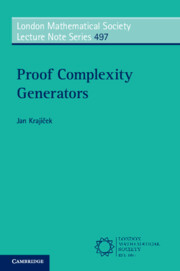Refine search
Actions for selected content:
2 results

Proof Complexity Generators
-
- Published online:
- 29 May 2025
- Print publication:
- 26 June 2025
1 - Concepts and Problems
- from Part I - Basic Concepts
-
- Book:
- Proof Complexity
- Published online:
- 25 March 2019
- Print publication:
- 28 March 2019, pp 11-38
-
- Chapter
- Export citation
